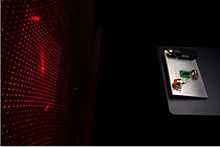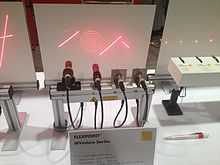Structured light


Structured light is the process of projecting a known pattern of pixels (often grids or horizontal bars) on to a scene. The way that these deform when striking surfaces allows vision systems to calculate the depth and surface information of the objects in the scene, as used in structured light 3D scanners.
Invisible (or imperceptible) structured light uses structured light without interfering with other computer vision tasks for which the projected pattern will be confusing. Example methods include the use of infrared light or of extremely high frame rates alternating between two exact opposite patterns.
Structured light is used by a number of police forces for the purpose of photographing fingerprints in a 3D scene. Where previously they would use tape to extract the fingerprint and flatten it out, they can now use cameras and flatten the fingerprint digitally, which allows the process of identification to begin before the officer has even left the scene.
See also
- Stereoscopy
- 3D scanner#Structured light
- Structured Light 3D Scanner
- Dual photography
External links
- Projector-Camera Calibration Toolbox
- Tutorial on Coded Light Projection Techniques
- Structured light using pseudorandom codes
- High-accuracy stereo depth maps using structured light
- A comparative survey on invisible structured light
- A Real-Time Laser Range Finding Vision System
- Dual-frequency Pattern Scheme for High-speed 3-D Shape Measurement
- High-Contrast Color-Stripe Pattern for Rapid Structured-Light Range Imaging